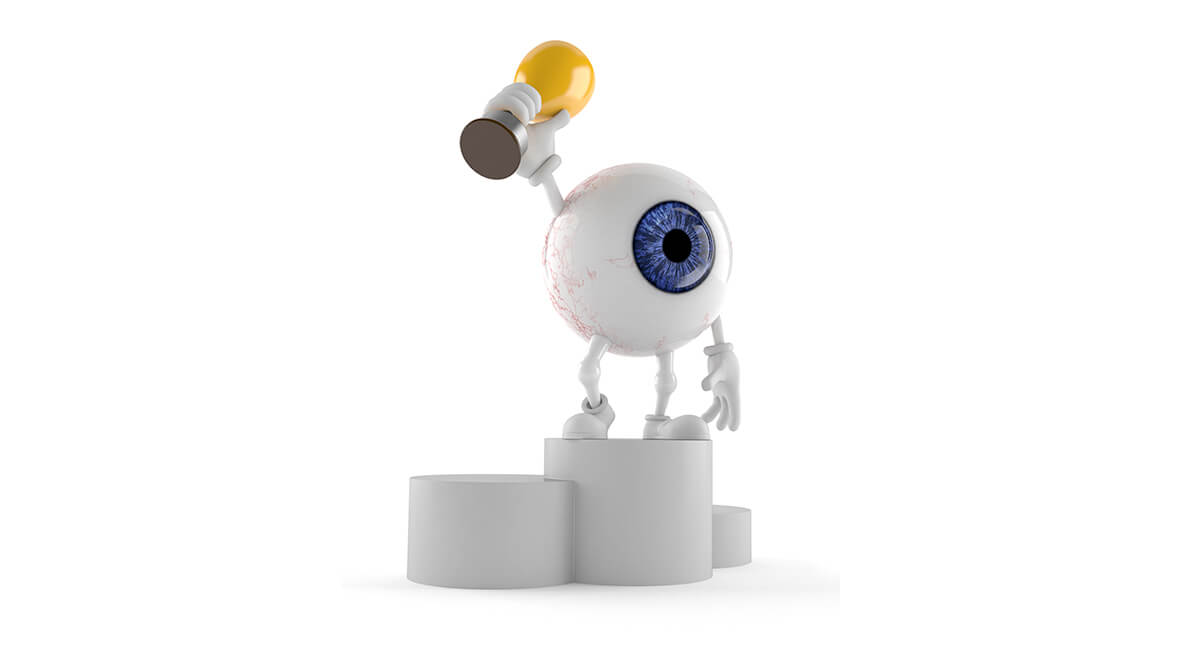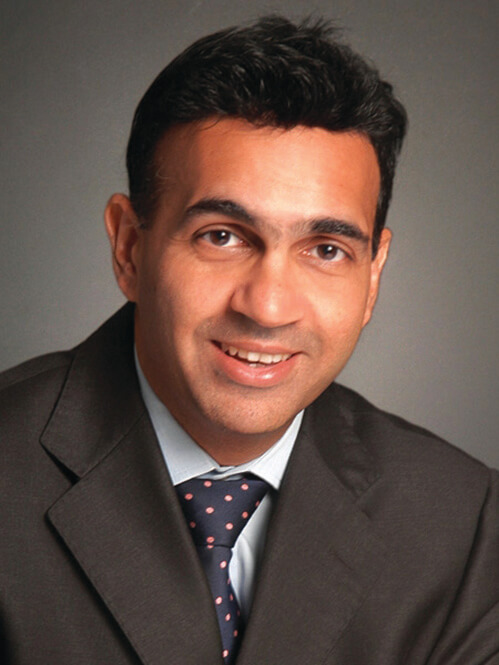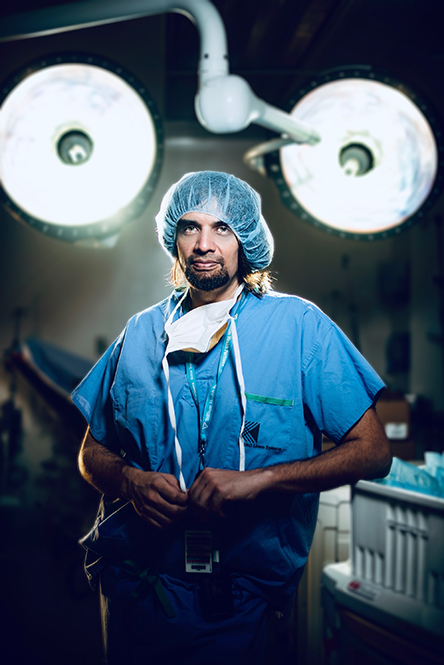What makes a Formula One world champion? Knowledge, dedication, driving expertise, superior reflexes and hand-eye coordination, as well as a great engineering team, are just some of the key elements that make a skilled race car driver.
As it turns out, these features are also essential in eye surgery – one doesn’t only need the know-how to use the best surgical techniques, dedication and the foresight to innovate in this field, he needs a fantastic team behind them as well.
We spoke with three of the many inspirational champions in ophthalmology to learn what puts them in pole position.
Prof. Jod Mehta
Head of Corneal and External Eye Disease Service and Senior Consultant for the Refractive Service, Singapore National Eye Centre (SNEC)
As one of the leading cornea specialists, Prof. Mehta is recognized worldwide for his expertise in complicated corneal transplant techniques, penetrating keratoplasty, anterior lamellar keratoplasty, endothelial keratoplasty, combining penetrating keratoplasty and cataract surgery, as well as combining endothelial keratoplasty and cataract surgery.
“I like the fact that we can improve not only people’s vision but their quality of life, whether it’s through a corneal transplant or refractive surgery,” shared Prof. Mehta. “I also enjoy the synergy between the academic side of our field and the clinical work, which has really come a long way in the last few decades.”
Some of Prof. Mehta’s responsibilities include guiding clinical fellows and postgraduate students in their work. “I try to lead by example for both my clinical and research team,” he said. “There is no better legacy as a clinical teacher or mentor than to train fellows or junior faculty, who can then develop under your guidance and take that knowledge with them.” As a clinician scientist, Prof. Mehta has had the privilege to mentor clinical fellows and PhD and MSc students. “I would like them to think that they can achieve anything they want in our field.”
A memorable moment in his career was being one of the youngest trainees appointed as a resident at Moorfields Eye Hospital in London, UK. “That gave me the opportunity to work with many outstanding ophthalmologists, which really taught me important lessons in understanding clinical work and also the importance of research,” he said.
After seven years in Moorfields, moving to Singapore (initially as a fellow) was a real eye-opener for Prof. Mehta. And staying on as faculty taught him a lot – not only about developing as a clinician, but also as a scientist, inventor, educator and speaker. “There have been many highlights along the way and opportunities in Singapore, which led me to where I am today,” he shared. “I could have never imagined this was possible when I first came 11 years ago. Someone told me once, ‘opportunities are about putting yourself in the position to receive them and then taking advantage of them’. It’s so true.”
What gets him out of bed every day? “My drive is my hunger to keep doing things better, not only as a clinician and researcher, but also for my patients. Our patients ensure that clinical medicine is never a boring job, and if you combine this with an academic career, you are constantly challenged throughout your career.” Prof. Mehta, who is also head of the Tissue Engineering and Stem Cells Group at the Singapore Eye Research Institute (SERI), added that he would not be able to do what he does without an amazing support staff. “I am very lucky to work with fantastic nursing and administrative staff in our clinic facility at SNEC and a great research team at SERI,” he concluded. “The support they give me is more than I could ever have wished for.”
Dr. Harvey Uy
Medical Director, Peregrine Eye and Laser Institute, Philippines
Dr. Uy specializes in treating extreme eye ailment cases and was the first ophthalmologist to conduct laser refractive cataract surgery in Asia. He was also the first Filipino doctor to implant a slow-release steroid device to treat uveitis and pioneered the use of antibodies to treat macular degeneration and retinal diseases in the Philippines.
“I am from the Philippines and I hope this will inspire ophthalmologists from developing countries,” shared Dr. Uy. “It doesn’t matter where we are from, nor whether we are young or old – as long as we have an inquisitive mind and the desire to work hard and collaborate, we can contribute to the advancement of science and medicine.”
As an ophthalmologist, Dr. Uy is happiest helping patients preserve or restore the gift of sight: “We can treat one eye at a time, but we can also develop new techniques or technologies that will have a multiplying effect and allow our colleagues to better help their patients and communities.”
Recounting some of the many remarkable moments in his career, he said: “Our first clinical trial, which was the Retisert study, opened many research doors for us. We were also fortunate to conduct the first femtosecond laser-assisted cataract study in Asia and to work on accommodation restoration by laser lens softening.”
Dr. Uy came up with the idea of grading femtosecond laser images and using these to optimize laser patterns and target only the laser nucleus. He also started some first-in-man studies on topics including modular and multicomponent intraocular lenses (IOLs), dual optic IOLs and capsulotomy instrumentation. “We also participated in many pharmaceutical trials such as Ozurdex, anti-VEGF trials and new compounds.”
When faced with challenges, this is Dr. Uy’s philosophy: “Research and development is like a roller coaster ride – there are ups and downs. We go through a process where sometimes the best laid plans work, and many times, they don’t. The important thing is to learn from each failure and to keep trying until the plan comes together. And to always ask, ‘why not?’”
Dr. Iqbal “Ike” K. Ahmed
Medical Director, Prism Eye Institute, Ontario, Canada
Assistant Professor, University of Toronto, Canada
Dr. Ahmed is world-renowned for his skills and groundbreaking work in the diagnosis and surgical treatment of highly complex eye diseases, like glaucoma. He performed the first laser cataract surgery in Canada, and he has trained numerous surgeons in innovative surgical techniques. He’s also been at the leading edge of novel treatments for glaucoma and cataract, as well as lens implant surgery.
With a keen interest in the development of advanced microsurgical devices and techniques in glaucoma surgery and complicated cataract extraction, Dr. Ahmed has designed innovative glaucoma diamond scalpels for surgery, microsurgical instrumentation and devices, implants, and techniques for the management of the dislocated cataract, iris reconstruction and glaucoma implant devices. He has done pioneering work in innovative glaucoma surgery, developing and coining the term ‘Micro-Invasive Glaucoma Surgery (MIGS)’ as a new genre of surgical approaches and devices.
“In medical school, I was very interested in surgery. I fell in love with the idea of using my hands to improve sight, and I was really interested in the technical part of it as well,” he shared. When asked what is most important to him as an eye surgeon, he replied, “To do what medical school taught me: To help people feel good about themselves, to be productive and happy, taking care of my patients.”
He finds working with trainees, fellows and residents immensely satisfying – to see them improve and develop their skills over the years; meanwhile, patients are a source of motivation. “Every day, it’s inspiring to see patients go through what they go through, their perseverance and strength in challenging cases. They are the reason we do what we do.”
And how does he unwind after a day at work? “I like to work out and exercise,” he shared. “I don’t find work heavy and stressful. Work is my hobby. For me, work is a very happy place. But it is important to have a balanced life and to care for your family.”






